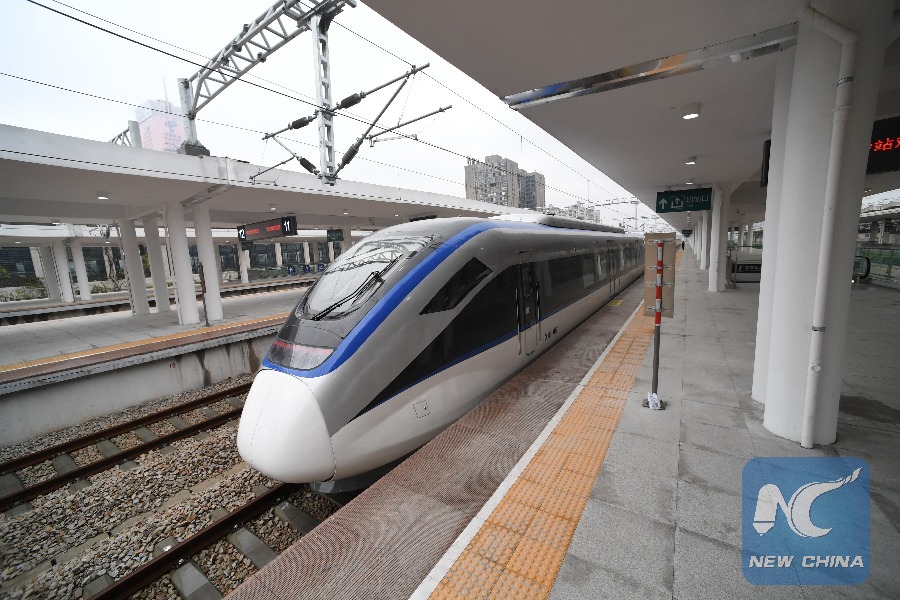
Photo taken on Dec. 26, 2016 shows a train at the Changsha Station of the Changsha-Zhuzhou-Xiangtan Intercity Railway in central China's Hunan Province. The 95.5-km-long intercity railway was put into service on Monday, with a speed up to 160 km per hour at the initial operations. (Xinhua/Long Hongtao)
by Xinhua Writer Zhu Junqing, Ouyang Wei
BEIJING, June 4 (Xinhua) -- It was freezing cold in early spring in Astana, Kazakhstan, where the temperature had plummeted to minus 20 degrees Celsius.
In a shabby workshop, Long Guzong and his co-workers were working away in heavy clothing that made their movements astronaut-like.
After months of tests and adjustments, the technicians from CRRC Zhuzhou Electric Co., Ltd., based in China's central city of Zhuzhou finally solved a technical problem vital to the train's safe operation in extreme coldness.
"The biting coldness was impressive; we solved the safety problem that had frustrated many experts at the time," Long told Xinhua recently, 11 years after that assignment.
Dedicated to making people's lives easier and better, Long and his co-workers are among tens of thousands of Chinese innovators who are contributing to the country's innovation-driven development.
China's coastal cities can be considered the country's "locomotives" in its development, among them the city of Shenzhen. However, over the past 40 years of reform and opening-up, the middle and western parts of the country have been gradually catching up with the eastern area. The city of Zhuzhou that produced China's first locomotive is a classic example.
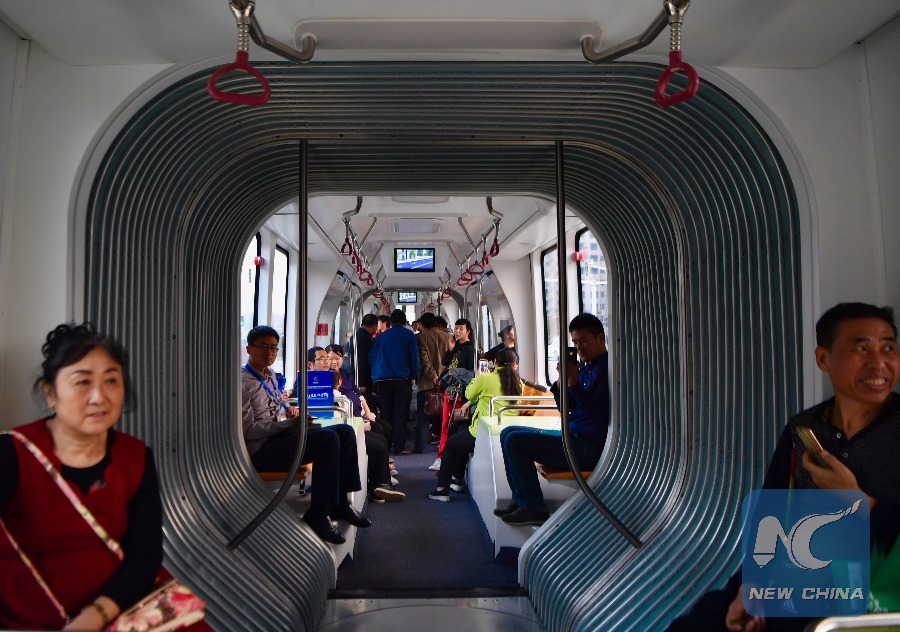
Citizens take a smart bus during the test run in Zhuzhou, central China's Hunan Province, Oct. 23, 2017. The test run of the ART, Autonomous Rail Rapid Transit, started in Zhuzhou on Monday. The ART is developed by the research arm of CRRC Zhuzhou Locomotive Co., Ltd., which produces key parts for China's high-speed railway. The bus is about 30 meters long and equipped with sensors that can read the dimensions of roads and plan its own route. (Xinhua/Xue Yuge)
RAIL INNOVATION HUB
Zhuzhou, a small city in central Hunan province, is turning from a traditional industrial base into a Chinese innovation hub, where high-tech corporations, start-ups and innovators gather.
The metamorphosis started with the rapid development of China's rail transit.
Liu Youmei, 80, who worked in the train manufacturing industry for almost six decades, has witnessed the innovation-driven development with Chinese characteristics in China's rail transit history.
"There was no bus or other public transportation linking Zhuzhou railway station and our factory when I arrived at Zhuzhou 57 years ago. On the first day of our arrival, my classmates and I had to walk to the factory and return with a borrowed tricycle with a flat cart to transport our luggage," he said.
In 1961, Liu and some 20 graduates from Shanghai Jiao Tong University were assigned to work in a locomotive factory in Zhuzhou, which was established to repair locomotives imported from the West, where steam locomotives had been used for a century.
To bridge the 100-year gap, Liu and his co-workers worked night after day, and independently designed Shaoshan series electric locomotives, which was the dawn of electrification in China's railway industry.
The veteran engineer, who has been honored by the Chinese Academy of Engineering for his contributions to railway development, said that China must master core technologies in key fields.
"In 1998, we wanted to introduce the DC traction motor train, but developed countries refused our purchasing request, as well as the introduction of supercapacitors," Liu said.
"At that time, we were forced to do research and development independently, and finally broke technological bottlenecks and manufactured DC traction motors and supercapacitors with full intellectual rights; the latter even beat the U.S. industrial leader," he said.
Nowadays, trains with Chinese "brains" and "nervous systems" run around the world. The advanced electric locomotives, metro trains and maglev trains have made Zhuzhou a landmark of world rail transit.
Moreover, the city's general aviation and automobile industries have made names for themselves and its innovation park is attracting industries like electronic information, new energy, bio-medicine, as well as environmental protection, among others.
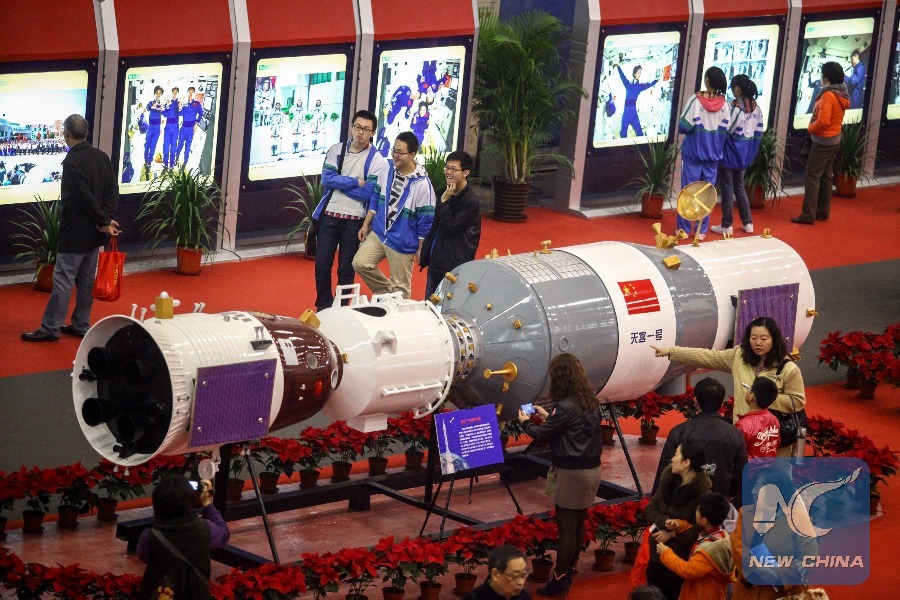
People look at a model of the Shenzhou-10 manned spacecraft docked with Tiangong-1 space lab module during an exhibition in Tianjin, north China, Nov. 9, 2013. (Xinhua/Li Xiang)
EMBRACING THE WORLD
In a globalized world, cross-border technological cooperation and exchange have become an irreversible trend. The small inland city keeps an open mind and is eager to embrace a new world.
"Science and technology are the wealth of all mankind," said Liu."Learning is different from plagiarism and learning from others is necessary."
Even CRRC Zhuzhou Locomotive Co., Ltd., the industrial leader on the world stage, does not exclude international exchanges. From 2003 to 2004, 75 staff members went to Europe to learn welding, painting, assembling and other technologies.
Fan Yunxin, vice chief engineer of the company, said "We must depend on ourselves, and meanwhile stay open-minded to learn from others' more advanced technology."
In the early years of China's reform and opening-up, Zhuzhou Cemented Carbide Group Co., Ltd. introduced a metal-cutting tool production line, which "helped the company catch up with the industry leaders in the shortest period of time," said Zhang Weibing, director of the group's research and development center.
After years of adapting foreign technologies and independent innovation, the company now boasts several world-leading technologies, and its products have been used in China's Shenzhou spacecrafts, said Xu Shangzhi, chief technology officer with Zhuzhou Cemented Carbide Group.
"All technological introductions are based on a country's existing scientific and technological strength," the academician said. "The introduction of technology only inspires us, we still need our own innovation capability in the long run."
Zhou Qinghe, president of CRRC Zhuzhou Locomotive Co., Ltd., said "If there is no innovation after technological introduction, we will fall into a vicious cycle, where introduction brings us advanced technology and saves us from long-term research and development, which also leads to heavy reliance on others."
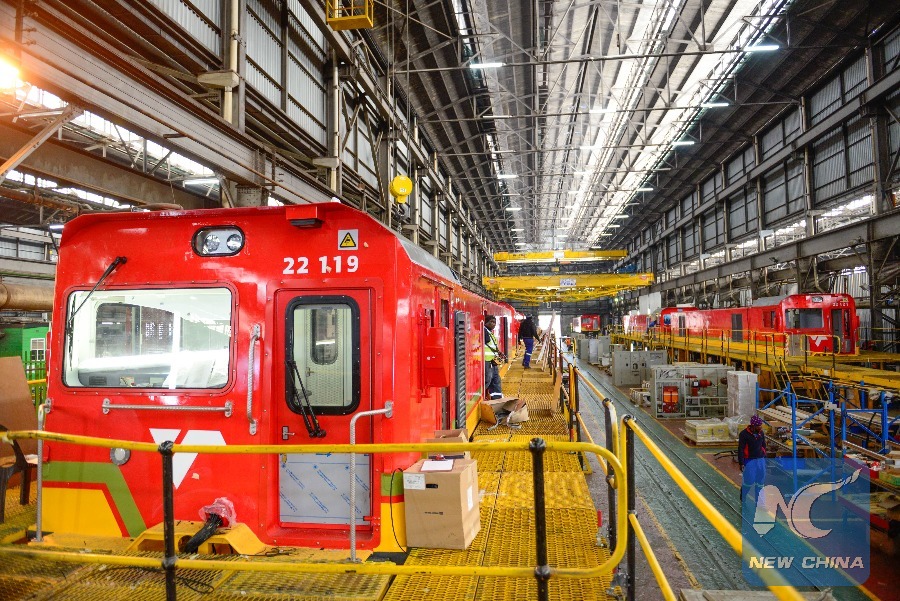
Photo taken on July 27, 2017 shows two Chinese locomotives to be assembled at the Transnet Engineering Koedoespoort Plant in Pretoria, South Africa. 305 of the 554 locally assembled locomotives have been delivered to South Africa since October 2012 when the South Africa state rail company Transnet contracted the Chinese Zhuzhou Electric Locomotives Company under the Chinese locomotive manufacturer CRRC to supply first 95 locomotives. (Xinhua/Zhai Jianlan)
ONE WORLD, ONE DREAM
China's high-quality innovative development has helped change people's lives around the world.
In India, Amit Mak is now used to taking the metro train to avoid traffic jams.
"Not only the quality of the rolling stock, but the inside is comfortable. It provides all kinds of comfort as well as convenience and a cool atmosphere," he said.
Dilip Jadeja, vice president of IL&FS Rail Ltd. in India, said "A metro line also brings in development along the metro corridor, with office and business complexes, shopping malls and housing complexes coming up, which in return facilitate people's life."
Working at the assembly workshop in the rolling stock center of Chinese rail transit equipment manufacturer CRRC, Vijayakumar Sundar, 40, occasionally recalls when he was a child and used blocks to build trains.
However, as a child, he never thought of realizing his "train dream" in a Chinese enterprise.
"I participated in a three-month training in China, and accumulated skills and managing experience in my work," said Sundar, who was among the first batch of local employees and was later promoted to the position of a workshop director.
With a "go global" strategy, enterprises based in Zhuzhou successfully entered overseas markets and applied innovative measures, including localization, joint ventures and cultural recognition.
Taking CRRC Zhuzhou Locomotive Co., Ltd. as an example, its three industrial bases in Malaysia, South Africa and Turkey employ nearly 500 people, among whom 80 percent are locals.
With win-win cooperation, China has not only achieved sustainable growth for itself, but also driven the world economy forward, creating jobs and cultivating talents for other countries.
Different from some countries, China is open to technological transfer to help other countries' development. Muhammad Shoaib from Pakistan, 27, is one of the nine foreign workers in Zhuzhou Locomotive Co., Ltd. who has come to China to learn, along with others from his home country as well as Germany and Australia.
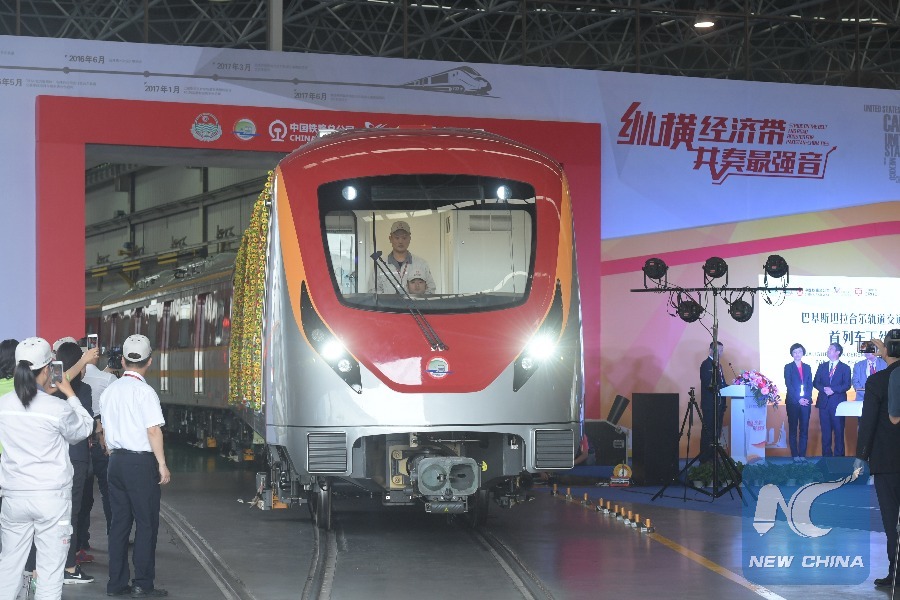
Photo taken on May 15, 2017 shows a new subway train made for Pakistan Lahore Orange Line Project at the CRRC Zhuzhou Locomotive Co., Ltd. in Zhuzhou, central China's Hunan Province. A train designed for a Pakistani subway rolled off the production line in central China's Hunan Province on Monday, the first of 27. The train with five coaches was designed for the 25.58 km Orange Line Metro in Lahore, Pakistan's second largest city. (Xinhua/Long Hongtao)
"Pakistan's first metro train railway was constructed by China. I still remember the jubilant crowd on the delivery day, with men and women, the elderly and children taking photos with the train," Shoaib said.
After years of studying and working in China, Shoaib has become a China hand. He said he has fallen in love with a girl in Pakistan, and plans to take her to Zhuzhou after marriage.
(Xinhua journalists Yang Jian, Sun Oumeng, Liu Chang in Beijing, Lin Hao in Kuala Lumpur, Zhang Xingjun in Mumbai and Jin Zheng in Kenya also contributed to the story.)

